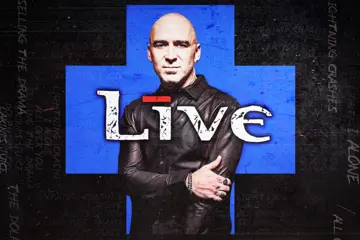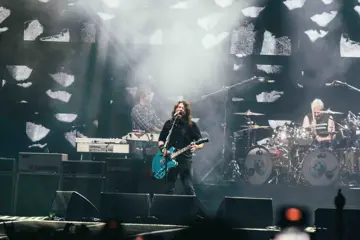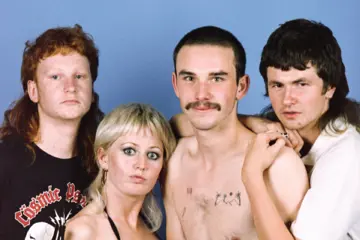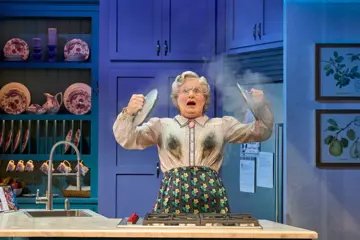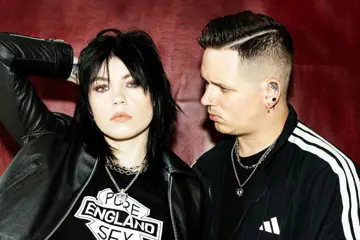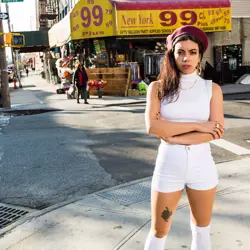 Hurray For The Riff Raff
Hurray For The Riff RaffThe music that New York-bred, New Orleans-based artist Alynda Segarra has been crafting for the last decade under the guise of Hurray For The Riff Raff has always been targeted at those marginalised by society, whether by class, gender, sexuality, race or any other defining character that may set a person apart from mainstream society.
For her sixth full-length album The Navigator Segarra honed her sights specifically on the home she left as a teenager to travel the railroads around America - jumping trains to sate her wanderlust in that finest 'hobo' tradition before washing up in New Orleans - specifically the gentrification of The Bronx and how this has affected the sizeable Puerto Rican community who call that New York borough their home.
To achieve this task, Segarra constructed a fictional character named Navita Milagros Negron - the titular "Navigator" - and placed her in a sci-fi inspired dystopia to both examine the root of the problems as she envisaged them and also quest for potential solutions. She hadn't set out to make a quasi-conceptual album, but that's where she ended up by following her muse.
"It's funny because you spend a lot of time making an album and sometimes by the time it releases you're already onto your next idea, and you have to tour an album while being in this place of thinking about the next one," Segarra reflects. "So by the time [2014's] Small Town Heroes was released I was thinking about The Navigator, and just thinking about how I wanted to grow and change musically. I felt this desire to definitely get in touch with my past and my ancestry, and the idea of the conceptual album and kind of the character going down this Ziggy Stardust type of route just felt like a more creative way, and felt like what I was ready for.
Don't miss a beat with our FREE daily newsletter
"For some reason it got me more in touch with myself and who I was as a kid, and the place I grew up in, in order to make this story around it. Also, with making albums, I love concepts and ideas: I feel like it doesn't have to be an explicit musical - it doesn't have to be cut and dry, like, 'Here's the song that means this!' - but I love the idea that there's this other story going on and all of the songs are kinda the soundtrack to this inner-story. I really like albums like that, which you can get lost in, so it made it a lot more exciting and inspiring for me when I felt that I was sorta stuck musically."
The character of Navita, while heavily based on Segarra's own life experiences, also allowed her to approach the subject in far broader brush strokes than pure autobiography would allow.
"Oh, definitely, with the main character Navita I wanted to create kinda of a superhero," the singer tells. "I felt like I wanted to create a character who was like everything I was striving to be, and who was braver than me and tougher than me. I wanted to create this character who represented who I was when I was a kid and who would also go through this change that I wanted to go through: I wanted to get to this place of pride and knowledge, and I wanted to get more in touch with my ancestors and do them proud.
"So I created her thinking about how tough I feel like I was when I was younger, and also it was really a nice experience to try to teach her a lesson - but it was teaching me a lesson - and it was a really great way to just look back on when I left home and try to make sense of it and create this Wizard Of Oz-esque story. It really felt like when I was a kid I left home - I woke up and all I wanted was to just get away from everything: from my identity, from my family and from the city that I grew up in - and I went as far away as I could, then when I came back everything I knew had already changed and was kind of missing.
"I realised how much I'd left and realised how much I had, and how rich my culture is. So this album is talking about that experience: New York changes very fast, so it's just another way of looking at what Navita went through when she woke up and didn't recognise anyone or anything, and she realised, 'Wow, where did all my people go?'"
Remarkably, this quest for identity seems magnified exponentially with the current political tumult being experienced in America, especially in relation to immigrant populations.
"Oh yeah," Segarra sighs. "There's a lot of themes that I was thinking about when I was making the album that now seem so magnified, definitely identity and intersectionality. The Navigator is also this concept of people who are constantly having to move through these barriers, and constantly never quite fitting into boxes - we live in this intersection of all these identities, so how do you just fully be who you are and how do you try to experience some sense of freedom when there's so many barricades and so many borders that are constantly being built around you and which separate you from other human beings and separate you from parts of yourself and your past and what you want your future to be? There were all these other concepts going on that I was dealing with and now I feel like all of that has been so magnified.
"Then there's less-vague concepts, such as now the topic of Puerto Rico itself is so big and what the people there are going through, and how they're not being treated like full US citizens. And there's so much talk about immigration and deportation, there's so many people that are saying, 'Where are all of my people going to go? We're supposed to leave now because this President feels like we're not worthy, and feels that we don't contribute?' So I was thinking about these things so much, but at the time I never thought Donald Trump was going to win!
"The whole time I thought people would be going, 'Why are you still talking about the wall when Donald's gone?', but that was wishful thinking and I didn't know how bad of a state we were actually in. Now I feel that it's so much more important for me to play this music and think about these sorts of things, and just really try to spread these ideas and just ask questions.
"That's what I love about music, you can really ask a lot of questions and it makes people think in a way that doesn't feel like it's attacking - people can sit and listen to a song, and really think about something when nobody is around, and it's just them and their soul, and I think that's why music makes a difference."
Despite the more refined focus, The Navigator doesn't feel miles removed topically from Segarra's past work in that it speaks directly about a class of people widely viewed as underdogs, but presents her disaffection in a manner that highlights commonality and makes the themes universally relevant.
"I've always been drawn to art that was about the underworld," she smiles. "What I've always loved about folk music was that it was made by people whose accomplishments and what they contribute to society is so huge, but it's not really commercial so their accomplishments are not always seen as big as they are. They made these folk characters or they wrote these blues songs and it's kind of like it's only seen as worthy if it makes a lot of money, and what I love about folk music is that those people added so much and maybe it didn't even make a dollar.
"I think of that song Dark Was The Night, Cold Was The Ground [by Blind Willie Johnson], which was shot into space as an example of the human condition, and it's a blues song that doesn't even have any words - it's just humming - but there was something about it that made people think, 'This is about humanity, you can just feel it. Hopefully an alien finds it and thinks that that's what humanity is all about'.
"So that's what I love about folk music, and that's what made me want to write songs, so it always felt natural to write about people who don't get enough credit. That's what I've always seen it as and that's a lot about what The Navigator is - I was thinking a lot about cities and gentrification and about immigrant people and how immigrant people keep cities going.
"They're the people who do the work that make the city move, yet so often they're told that they're not worth anything and that they should just go back to where they come from. Or they're told that they never accomplish anything because maybe they couldn't get a degree, but maybe they made music that made people even want to go to that city in the first place. So that's a lot of what I've always thought about, and that's what makes me excited to make songs - just talking about people that I'm inspired by."
The other notable shift on The Navigator compared to past Hurray For The Riff Raff releases is the musical focus: the alt-country, folk and bluegrass intonations that Segarra did so well in the past have been replaced by a relatively exotic mixture of Latin rhythms and '70s rock. Was this musical shift always on the cards or was it sculpted to serve this particular batch of songs?
"I feel like it was always going to happen," she muses. "I think that with Small Town Heroes a funny thing happened where it felt like people who were listening to me for the first time got an impression, like, 'This is the music I make,' and that I make music that sounds like the Blue Ridge Mountains. But with the albums I've made in the past, it's always been a lot about experimentation, and I just love music and I love it whether its '70s rock or whether it's The Velvet Underground or whether it's psychedelic music from Brazil: I just find that all of it is folk music, not just country or alt-country. So I think that it was always bound to happen.
"I grew up listening to punk, so I've always been trying to experiment and always trying to become a good songwriter. I feel like I start with a story that I want to tell or an emotion I want to express, and the sound of the song kinda comes as an afterthought. That's what I love about somebody like Tom Waits - there's a lot of experimentation there and the sound is a vehicle for telling the story.
"But with The Navigator I really just wanted to dive into this sound that I feel like is the sound of the city - it's a mixture of styles and it's gritty and there's street poetry that holds it together, but there's Latin rhythm and there's rock'n'roll and also cinematic moments when you're in the city and you're experiencing all of these different people and walking through it. I wanted it to feel also like a play or a production, so it just felt really natural and it's just what I was being inspired by when I was writing."
You get the impression that this new material would be fun to perform live and Segarra agrees while explaining that the new more upbeat sound also dragged her out of her shell a bit in the live realm.
"I feel like I've definitely gone through a change as a performer," she enthuses. "I've definitely learned so much about live shows and I feel a lot more like I've broken through with some stage fright. I'm always just trying to get better and as a person I feel like I'm actually very shy, so this has been a really great experience in learning how to just let loose.
"And also to be in a political time that feels like it's so frightening and where it feels that there's no time to be insecure, there's no time to be scared, you just have to go out there and express yourself and to tell your truth and to try to speak to people in the most honest way you can.
"That's what the live show has been, and bringing in this rhythm and playing with this band has helped me be more in the moment and shed that fear, and shed any insecurity or feeling of self-doubt. Somebody who really inspired me was Patti Smith, because I saw her perform right when I was about to go into the studio and after seeing her perform I was just never the same.
"There's so many music documentaries where, like, Bob Dylan will say, 'I saw Elvis and I was just never the same,' or John Lennon will be like, 'I saw Elvis on TV and thought, "That's what I want to do!"' and when I saw Patti Smith there was something in me that was like, 'That is what I want to strive for!' That is the power, the way she gave everything that she possessed in her body and the way she made the crowd feel and her truth and her poetry, I was like, 'This is what I want to do!' She's really been an inspiration to me."
Fittingly Segarra is about to play Bluesfest for the first time - the festival where Smith made such an indelible impression last year - and she can't wait to get back down to Australia, where she first visited in 2014 for a tour that incorporated headlining sets at Mullum Music Festival.
"Oh my god, it was amazing!" she gushes of her inaugural sojourn Down Under. "It's so funny, because whenever I meet people who are from Australia they're like, 'How was your trip?' or they ask where I was, and the only place I remember so vividly is Mullumbimby!
"We had such a great time at that festival, and I remember as we played a swarm of beetles descended on the town, it was like an episode of that show Fear Factor where bugs were being thrown at you! I think the American culture isn't as brave as Australia's, everyone was, like [adopts dismissive tone] 'It's not going to bite you, get over it'.
"But we had a great time exploring and we got to go to the beach a little bit, and it will be really great to come back and play the Bluesfest this time, because when we were there last time everyone was telling us about it."
And given that she was already thinking about The Navigator while down here last time touring Small Town Heroes, has Segarra already turned her mind to what direction the next album might take?
"Well, as I said, I really love concepts, so it normally starts with just an idea or a theme that has been really inspiring me and something that I feel is current, but also, like, a human idea that we're always thinking about and right now I've just been really thinking a lot about the changing earth that we're on," she offers. "I've been thinking about different concepts of nature that we can learn from, different ideas about how the earth is handing these changes that we've really added to.
"And I've been thinking about different ways that music connects with nature, so that's kind of the hippy place that I've been in - I've been trying to listen a lot to the earth and trying to see what it might be trying to say to us right now; that's definitely going to have an effect on whatever album I come up with next. But right now I'm still just writing a lot and trying to see what sticks."




